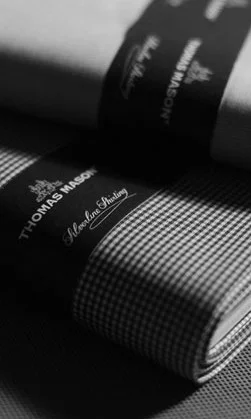The Story of Thomas Mason Fabrics
The finest shirting fabrics 1701 carries are Thomas Mason fabrics. Thomas Mason is one of the most well known names when it comes to shirts, but is not necessarily explained as to why it’s great. It almost seems like in fashion you can put someone’s name in front of a product and that gives you rights to mark up 10 times.
But Thomas Mason is a different animal.
First off, Thomas Mason does not make shirts; they make cotton fabric for shirts and have been known since 1780 to produce the highest quality cotton. They are the exclusive shirt supplier to the English royal family and was one of the first cotton mills opened in England.
Today, they are owned by an Italian company called Albini, but the story of Thomas Mason starts in England just before the Industrial Revolution:
In 17th Century England, nearly all garments were made of wool. In the middle of the century, cheap cotton, known as calico, began to be imported into England. At first, it was just a novelty, and nobody paid much attention to calico; the lower classes wore it because it was easily available but the middle & upper classes primarily paid no mind.
Then, the East India Trading Company (EIC), the group responsible for importing the majority of calico, underwent a great marketing effort to increase the demand of cotton. They “donated” 325,000 pounds of calico over the course of about 20 years to select groups in the middle & upper class.
This created a huge shift in the fashion market. The monopoly of the wool market was being threatened and in response, the wool industries then gathered together to lobby the government to outlaw the import of calico from India & Egypt.
In 1700, England passed the version version of the Calico Act; banning the import of dyed cotton fabrics into England. But that didn’t stop anyone; for the next 20 years, English citizens imported raw, un-dyed cotton and then dyed it in England.
Finally in 1720, the “loophole” was closed, and all the use and sale of cotton was outlawed. Meanwhile, the rest of the world continued to buy cotton, making it an ever more popular, and cheaper, choice for making garments that could easily be washed and dyed. English women were ripping down their drapes and making dresses out of them and black markets for cotton opened up in England, relegating cotton to only the dedicated fashionistas and counter-culture types.
But by 1774, England’s textile companies acquiesced to the English market’s demand and lobbied the England to repeal the Calico Act. This flooded England with new and cheap cottons.
Thomas Mason shirt factory in Leeds, England
Only a couple decades later would Thomas Mason open up, taking advantage of the latest technology: the steam engine.
The Industrial revolution really started at the end of the 18th Century and the textile industry was one of the first industries to see its immediate effects. Two inventors named Matthew Boulton & James Watt created a steam engine, that was instantly embraced by industry, and quickly applied to the textiles.
Previously, fabric mills were powered either by water or by donkey, so when the Boulton & Watt steam engine was invented, it was able to weave cotton ten times faster, which vastly improved production to a point where the mills in England couldn’t obtain raw materials fast enough.
Thomas Mason opened his mill at just the perfect time; the repeal of the Calico Act & the Industrial Revolution provided Mason the ability to obtain new, cheap & durable materials coupled with the technology to produce, relatively, enormous quantities of fabric.
Mason gained notoriety in Britain not only because of his efficient methods, but because of the high-quality of his fabrics. This reputation made Thomas Mason fabrics the supplier for fine shirting fabrics for Britain’s aristocracy and wealthy.
The Thomas Mason company continued to grow throughout the 19th Century and in the beginning of the 20th Century, at Prince Edward’s request, Thomas Mason became the exclusive supplier for Turnbull & Asser, the official shirtmakers for royal family.
In 1992, Thomas Mason was acquired by the Alibini Group, a family owned business with five generations of owners. Albini moved the Thomas Mason operations to Bergamo, Italy, as well as over 700 fabric books that make up the Thomas Mason archives, containing a sample of nearly every shirting fabric Thomas Mason has produced for over 200 years.



